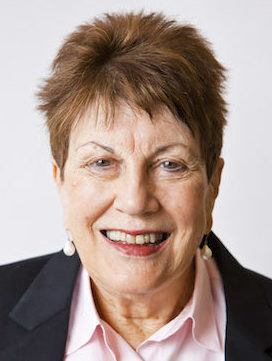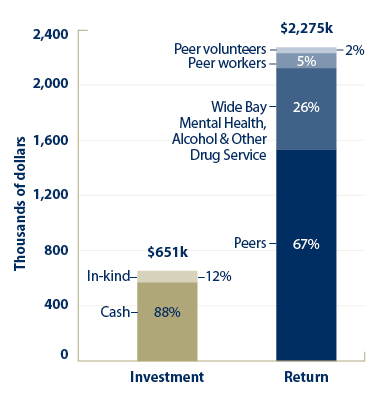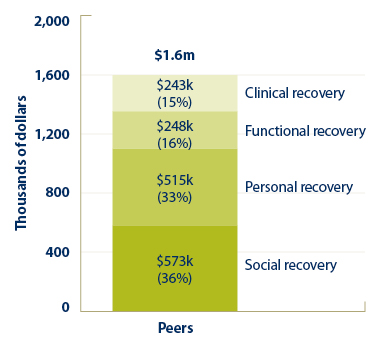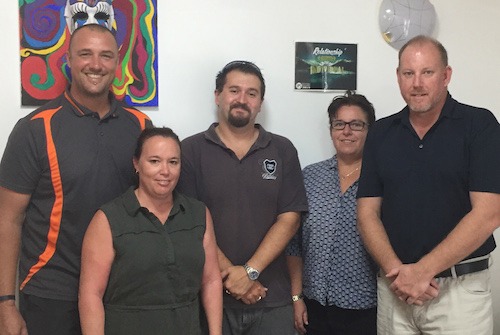
The value of a peer operated service
SVA’s analysis of a peer operated mental health service reveals just how and why this approach is so valuable to both those accessing the service and the local mental health system which benefits from their recovery. Here we share those insights.

- This article shares key insights from a Social Return on Investment (SROI) analysis of a 100 per cent, peer operated service run by Flourish Australia (previously RichmondPRA) in Hervey Bay, Queensland.
- The analysis identified that the POS delivered an SROI ratio of 3.27. That is, for every $1 invested, approximately $3.27 of social and economic value was created for stakeholders.
- Highlights of the service which contribute to this value are it being 100 per cent peer run, the informal environment, proactive nature of the service, and the inspiring peer workers and volunteers.
Peer support in the mental health sector is the help and support that ‘peers’ – people with a lived experience of mental health issues – are able to give one another.
… they bring their lived experience to the workplace to assist other peers in their recovery journey.
A peer worker is employed on the basis that they bring their lived experience to the workplace to assist other peers in their recovery journey.
While the prevalence of peer workers in mental health services has grown slowly over the last 20 years in Australia, there have been limited evaluations of the impact of the peer workforce. Also, there are few services that are 100 per cent peer operated – run by the peer workers and peer volunteers.
This article shares key insights from a Social Return on Investment (SROI) analysis of a 100 per cent, peer operated service run by Flourish Australia (previously RichmondPRA) in Hervey Bay, Queensland.
SVA used the SROI analysis to demonstrate where the main value is created and to highlight the key features of the service that create that value.
These insights may be useful for organisations seeking to expand or replicate a peer operated service, or for those looking to gain a deeper understanding of this effective form of support.
Hervey Bay Peer Operated Service
Flourish Australia is a provider of mental health services in NSW and Queensland and a leading advocate for, and employer of, peer workers. The Peer Operated Service (POS) in Hervey Bay started in 2011 – initially as a pilot funded by the Queensland Government. Queensland Health continues to fund the POS.
… can reduce the need to access the local health system’s clinical services – thereby helping prevent or shorten hospitalisation…
The community-based service provides recovery-oriented support to adults with a mental health issue. Being 100 per cent peer operated, the service is run by the peer workers and volunteers all of whom have a lived experience of a mental health issue. They also consult with and involve the peers who use the service about its ongoing operation.
Recovery-oriented support
Recovery-oriented support embraces the possibility of recovery and wellbeing created by the inherent strength and capacity of all people who experience mental health issues. It seeks to maximise self-determination and self-management of mental health and wellbeing and involves person-first, person-centred, strengths-based and evidence-informed treatment, rehabilitation and support. – A national framework for recovery-oriented mental health services: guide for practitioners and providers, The Department of Health
“One of the fundamental principles of the service,” explains Pamela Rutledge, CEO, Flourish Australia, “is that peers can effectively support others with lived experience of a mental health issue and, as a result, can reduce the need to access the local health system’s clinical services – thereby helping prevent or shorten hospitalisation reducing pressure on those services.
Crucially the POS uses a model of ‘intentional peer support’ or IPS. This model is based on the principles of respect, shared responsibility, mutuality and reciprocity. For the workers and volunteers, being intentional means having a clear purpose when they communicate and support a peer, especially when sharing their own experiences.
As Evan Fulton, Flourish Australia’s POS Manager, says: “We’re very honest and transparent about the model. It helps us to have healthy peer relationships with clear boundaries. Peers understand that we’re here to intentionally support them to move towards something better.”

… we’re led by the people who access our services in terms of what they need…
Complementing the IPS is Flourish Australia’s broader ‘recovery action framework’ which outlines three vital behaviours for workers: to engage in recovery conversations and reflective practice and to use strengths-based language.
“A common approach and language provides a good foundation consistent with our commitment to peer work and peer operated services,” says Rutledge. “It means we’re led by the people who access our services in terms of what they need in order to pursue their recovery goals and how we support them to do that.”
The Hervey Bay POS has three aspects:
- Resource centre: a house in Hervey Bay accessible from 9am-5pm, Monday to Friday where people can access one-to-one support or group activities or simply drop in anytime.
- Warmline: dedicated phone line open office hours, after hours and at weekends accessible to everyone, but not a crisis support line.
- Rest and recovery house: a three-bedroom house where people can take time out from their existing living arrangements, to invest in self-care practices and develop new strategies and/or perspectives on current circumstances.
Having an idea of the social and economic value of a program enables us to talk to funders and government about the impact…
Flourish Australia commissioned SVA to conduct an SROI analysis to understand, measure and value the social and economic changes generated through the POS.
“As we’re very committed to the contribution that peer workers have to mental health services,” says Rutledge, “we wanted to know the social and economic value of the service and what impact it has on other services locally, including the public mental health service.”
“Having an idea of the social and economic value of a program enables us to talk to funders and government about the impact the program has for the investment made.”
Flourish Australia was also keen to learn the SROI principles and methodology and consider their application to other areas of the organisation.
“We wanted to build our own skills in SROI and in developing program logic models so that we could develop them for our other programs. It is part of our service co-development and co-design, as well as building the evidence base,” says Rutledge.
Evaluation overview
The SROI analysis assessed the outcomes created in 2014 when 141 peers used the service. It identified that the POS delivered an SROI ratio of 3.27. That is, for every $1 invested, approximately $3.27 of social and economic value was created for stakeholders. Figure 1 shows the breakdown of the investment and the return by stakeholder.
We were able to discharge people earlier because of the support they received from the POS.

The largest portion of value created by the service accrued perhaps unsurprisingly to the peers themselves – 67 per cent. Peer workers accrued 5 per cent and peer volunteers 2 per cent of the value.
However, the second largest portion of value (26 per cent) was found for Wide Bay Mental Health, Alcohol & Other Drug Service (WB MHA&ODS), part of the local Hospital and Health Service based in nearby Maryborough.
As a result of the recovery that the peers experienced, there was less pressure on these local services, specifically lower hospital admissions and re-admissions and shorter lengths of stay during admissions.
“People that had been long time Wide Bay mental health users were coming through the [hospital and health] service less often and staying for less time,” says Glen Adamson, Team Leader of Hervey Bay Community Health when the SROI analysis was conducted.
“We were able to discharge people earlier because of the support they received from the POS. We found that we’d get people to a certain point in their recovery, but they’d plateau out.
“POS would take them to the next level. They’d get their confidence back and start looking for work and be involved in the community,” says Adamson.
“Knowing that they had support, and that other people had been through similar experiences would help them step up.”
Value for peers accessing the service
Of the value the peers experienced, the highest valued outcomes were from developing a larger and more diverse social network (social recovery) – 36 per cent and from developing hope, self-determination and identity (personal recovery) – 33 per cent. (See Figure 2).
The ability to live independently, to work, and/or reduce reliance on long-held supports (functional recovery), and control over and management of symptoms (clinical recovery) also improved, however these changes were partially attributed to other services.

Insights as to what creates the value
There are a number of insights about what contributes to the value created.
1. Nature of the service
The first insights relate to the nature of the service and the value that creates for peers.
- 100 per cent peer operated helps break down barriers and build relationships
That the service is 100 per cent peer operated is crucial for peers who said that this was why it worked. A shared experience of a mental health challenge quickly helps to build relationships.
I have seen people’s body language instantly change and their curiosity piqued when explaining… the service.
As Fulton explains, “Knowing it’s 100 per cent peer operated really helps to breakdown barriers and establish connection very quickly and very easily in the peer relationship.
“I have seen people’s body language instantly change and their curiosity piqued when explaining or sharing the peer operated nature of the service.”
Fulton acknowledges that this doesn’t automatically guarantee success in terms of achieving outcomes. “However it’s a great connector and contributes to a sense of trust and a feeling of acceptance.”

Peers also appreciate that they are asked what they want, rather than told what they need.
“It is good to have a peer to relate to. These guys understand at a deeper level,” said one of the peers.
Another part of the philosophy of a 100 per cent peer operated service is to consult with and involve those who use the service about its ongoing operation. This embodies the values of the IPS of respect, shared responsibility and mutuality.
- Peer workers and volunteers are a source of inspiration
To see other peers doing well in jobs or on a pathway to employment is motivating and offers hope. Peer workers and volunteers are powerful role models of what a future can look like to people who might otherwise struggle to engage with a service of any kind.
As one peer worker put it: “The freedom to use my lived experience in a purposeful way to support people accessing the service ensures that I can role model… that recovery is absolutely possible.”
I aspire to become a peer worker and help other people who are going through what I have.
The peer workers and volunteers are inspired by their work and feel it as vocational. Supporting people on their recovery journey gives a tremendous sense of purpose. Peers respond to this passion and motivation for their recovery which ultimately contributes to positive outcomes.
One peer said: “Peer workers do this job because their hearts are in it. Not because of a pay check.” While another said: “I aspire to become a peer worker and help other people who are going through what I have.”
As a result of the IPS model, peer workers endeavour to use every interaction as an opportunity to support a peer towards recovery.
As one peer worker described it: “Although a person I am supporting and I may share some difficult experiences, I always ensure that the conversation and way forward is positive and within keeping of the person’s personal recovery plan. We always finish our conversations with hope.”
- Proactive nature of the support
Peer workers and volunteers actively check in (generally by phone call) if someone hasn’t been seen at the centre for a while, to see if they are doing OK or not. This has a big impact on building trust between the workers and peers
- Resource centre environment
Another important aspect of the service is the resource centre environment. As a ‘normal’ house it provides a more informal space to meet compared with other ‘services’ that people use. No appointments are needed; people are encouraged to drop by whenever they want.
“The house is very important. It is safe and always accessible,” said one of the peers.
2. Cohort accessing the service
The second area of insights is about the peer cohort themselves.
- Peers’ maturity and experience within the mental health system
The majority of the group that access the service are reasonably mature (with a median age of 44) and also predominantly have a severe and persistent mental health issue. As a result they have had both a long experience of living with a mental health issue and of engaging with the mental health ‘system’.
This has given me a glimmer of hope again. I have tried everything else and was starting to give up.
Because of their experience and reflection over the years, peers have a wealth of insights to share with each other.
They also have experience of numerous other services which haven’t supported them as the POS does, which makes them more willing to engage with the service.
“This has given me a glimmer of hope again,” said a peer. “I have tried everything else and was starting to give up.”
- Peers are willing to interact and reciprocate support to each other
Within the 100 per cent peer environment, socialising between peers happens more (quickly). Peers also appear to be influenced by the culture of recovery-oriented support which encourages them to reciprocate support.
Fulton explains, “We’re open and transparent about the intentional peer support model, so it is picked up on by others. This helps to create a positive, strengths-based language in peers which assists everyone to move forward.”
Peers enjoy the fulfilment that supporting another brings.
“Helping peers gives me a sense of purpose and achievement,” said one peer.
- Greater engagement created improved outcomes
The SROI analysis broke the cohort down into five groups based on the types of services they accessed and the outcomes they experienced. Not surprisingly, the greatest change and therefore the greatest value was derived by the groups that engaged most intensely with the service.
For some the key to the service’s success in their lives was ‘sticking with this’.
3. Surrounding ‘system’ and community
In addition to the value created for Wide Bay MHA & ODS (26 per cent of the value), the POS generated other benefits in the surrounding ‘system’ and community.
- The POS complements services provided by other non-government organisations
The POS benefits support workers provided by other non-government organisations. By helping peers to progress on their recovery journey and gain more independance, the POS enables support workers to work with more people.
“Self-worth and confidence grows at the Peer Operated Service which means… [our] support level can decrease,” said one partner service provider.
- The POS has had an impact on the understanding and acceptance of peer workers and of mental health issues.
… these [peer support] services are the new evolution of psychiatry and… will be the ‘norm’ in the future.
The local Wide Bay Hospital and Health Service has increased the use of peer workers in its own mental health programs in part having seen the success of the Hervey Bay POS. For example, a continuing care unit (CCU) set up in Bundaberg in 2015 provides a mix of clinician and peer worker support to people transitioning back into the community after hospital stays. The local mental health unit also now has peer support workers employed by the Queensland Government.
“I believe that these [peer support] services are the new evolution of psychiatry and although they are a new concept to mainstream treatment, they will be the ‘norm’ in the future,” says Adamson.
“It’s going to take a lot of acceptance from the mainstream, but I expect that peer support services will become fully integrated into mental health services as we see the outcomes from it.”
As POS Manager, Fulton works closely with the region’s community sector and as a result of the POS’s work sees more awareness, acceptance and acknowledgement of mental health issues.
“There’s definitely less negative attitudes towards people with mental health challenges in the local area,” says Fulton.
Results of POS evaluation
For Rutledge, the evaluation has provided the evidence that totally peer-based approaches are acceptable and effective.
“It’s evidence that people see value in a peer operated service. It’s making a difference not only to people with lived experience who are keen to access the service, but to how partner organisations and the local health service operate. They see the progress in people’s recovery and how that can free up their resources to support more people.”
It’s given us a better idea of who is there, and how you might best engage with those people and support them.
Also, the SROI analysis provided Flourish Australia with more granularity about the peer cohort.
“We’ve got a better understanding of the different people who access the service, their different needs, and what they’re getting from the service,” says Rutledge. “For example, some people have intense engagement and sustained outcomes, others engage irregularly. People come and go for lots of different reasons. It’s given us a better idea of who is there, and how you might best engage with those people and support them.”
For Fulton the evaluation has reaffirmed that the POS team is on the right track.
“It hasn’t changed what we do on the frontline, but has reassured us that we’re working towards a really healthy resource centre.”
He is also delighted by the remarks from peers about the support they receive from each other.
“They’re not just relying on peer workers. We’re creating a welcoming, non-judgemental culture in which people are able to form relationships, check in with each other and offer as much support at times as we, the peer workers, do,” says Fulton.
Summary
Flourish Australia believes that peer operated services have a lot to offer in supporting people to achieve their recovery goals and in strengthening local health systems – across the country.
This is an important contribution to program evaluation in mental health.
“The evidence on the value of peer work is growing everyday: that people feel motivated, they use acute services less and they have much more hope for their future,” says Rutledge.
“There’s something else that happens in the relationships with a peer whose had that experience and can use it purposefully.”
Since the evaluation, the organisation has been sharing the results of the SROI analysis and the success of the POS with the sector more broadly.
“This is an important contribution to program evaluation in mental health,” says Rutledge. “We’ll be happy to establish more peer operated services to share the benefits when the opportunity arises.”
Authors: Anders Uechtritz & Alex Humphry





